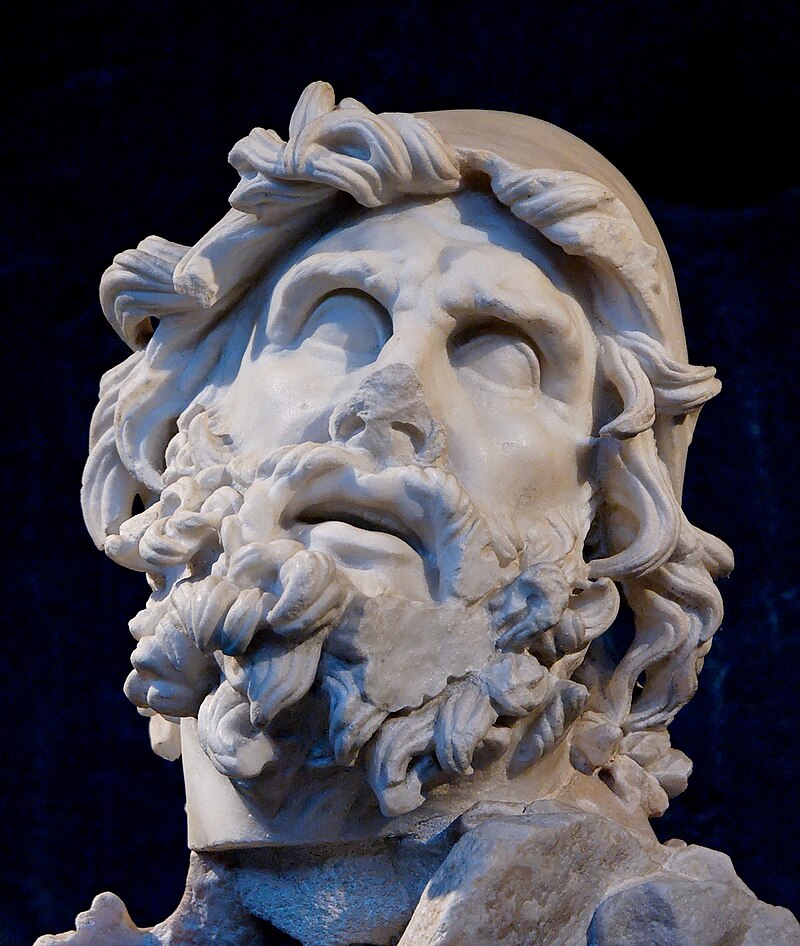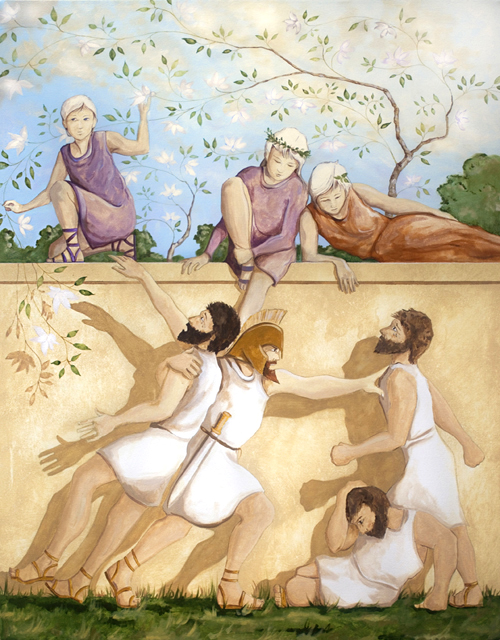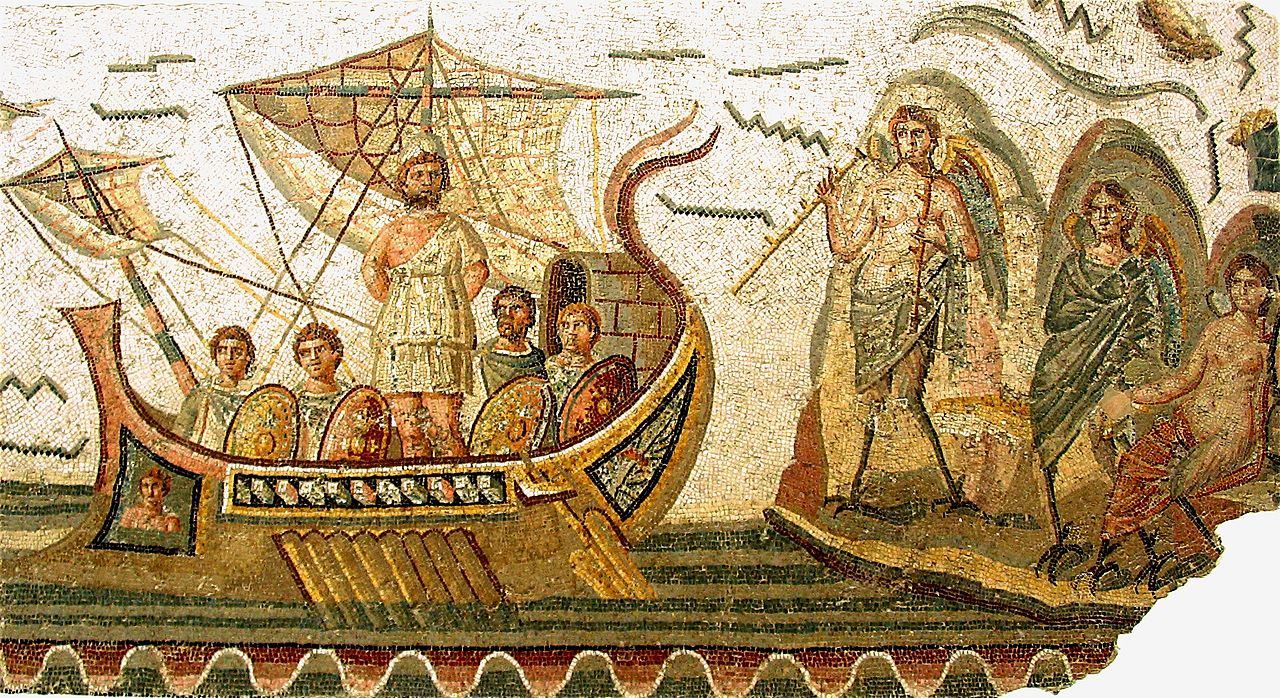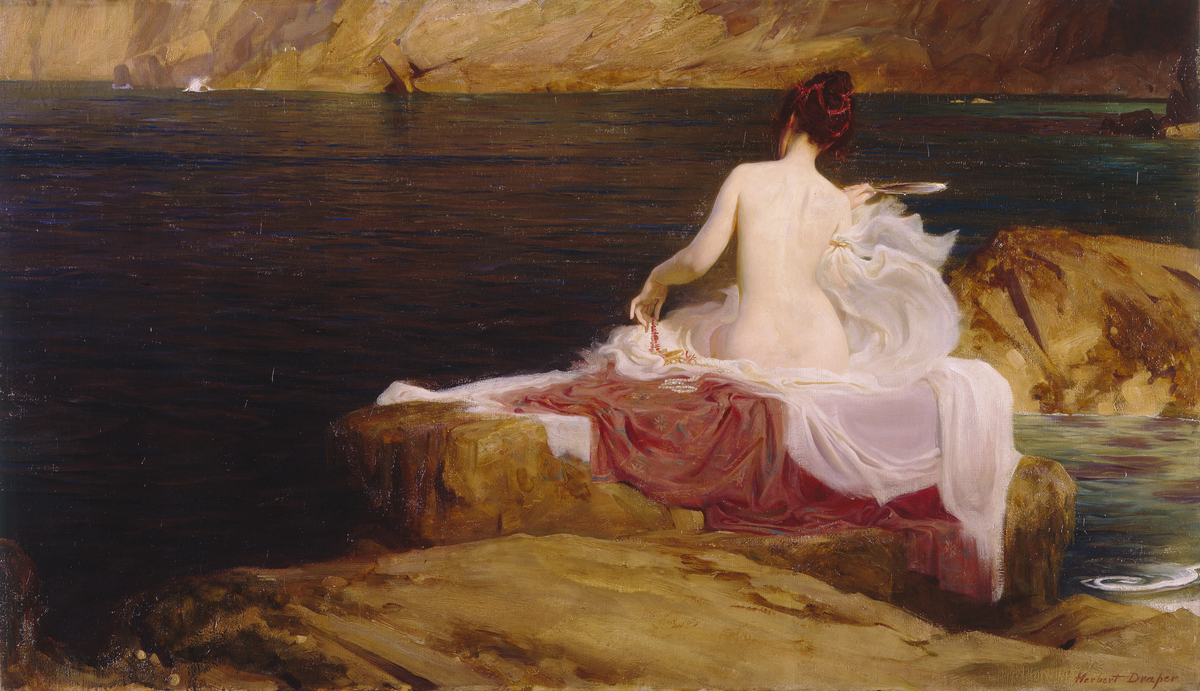Odysseus
Odysseus, the enigmatic king of Ithaca, wasn’t a ruler who relied solely on brute force. His true weapon was his mind, a labyrinth of cunning and eloquence. He could sway hearts and weave intricate webs of truth and deception with his words. This brilliance extended to the battlefield, where his strategic maneuvers aided the Greeks, culminating in the legendary Trojan Horse.
However, Odysseus’ greatest tale unfolded after the war. His ten-year struggle to return home, chronicled in the Odyssey, became a testament to his cunning, resilience, and unwavering desire to reclaim his throne and his life.

Parents: Laertes and Anticlea
Consort: Penelope, Circe, Calypso
Children: Telemachus
Helen’s Suitor
Odysseus, unlike the other suitors vying for Helen’s hand, had his eyes on a different prize: Penelope, Helen’s cousin. Fearing a war over his choice, Tyndareus, Helen’s father, took Odysseus’ cunning suggestion. In exchange for Helen’s hand, all suitors would swear to respect his decision and support the chosen couple. This clever plan secured peace, and when Menelaus won Helen, Odysseus remained to claim his true desire – Penelope – as his wife.
Avoiding the Trojan War
After marrying Penelope and starting a family in Ithaca, Odysseus’ peaceful life shattered. Helen’s abduction by Paris triggered the oath sworn by her suitors, including him. Duty called, but fate, as revealed by the seer Halitherses, promised a long and arduous journey. Unwilling to leave his newborn son behind, Odysseus feigned madness, yoking a donkey and ox together and sowing salt.

However, his ploy was exposed by Palamedes, the recruiter, who cleverly placed Telemachus in the plow’s path. The concerned father’s immediate reaction to protect his son revealed his sanity, leaving him with no choice but to join the Trojan War.
Recruiting Achilles
Fearing a prophecy of glorious but short life for her son Achilles, Thetis hid him disguised as a girl amongst the court of King Lycomedes. However, the Greeks, aware through a prophecy of Calchas that Achilles was crucial to their victory at Troy, needed a way to find him.

Enter Odysseus, the cunning strategist. Disguised as a peddler, he infiltrated the court with a peculiar mix of women’s finery and a single, gleaming spear. Achilles, betraying his warrior spirit, was the only one drawn to the weapon, revealing his true identity and setting the stage for his inevitable role in the Trojan War.
The Trojan War
Odysseus wasn’t just a brawny warrior in the Trojan War; he was the mastermind behind the scenes. His true strength lay in his cunning strategies and unwavering support for the Greek cause. When Agamemnon’s ill-advised plan to test the troops’ morale backfired, nearly causing a mass desertion, Odysseus’ powerful speeches and persuasive arguments kept the Greek army united.

He wasn’t just a gifted talker, though. Odysseus, alongside Diomedes, proved his mettle in daring night raids, eliminating key Trojan figures like the spy Dolon and even the Thracian king Rhesus. His strategic mind extended beyond the battlefield. He masterminded the capture of the Trojan seer Helenus, who revealed crucial intel on how to finally conquer Troy. This intel included recruiting Achilles’ son, Neoptolemus, and the formidable archer Philoctetes, showcasing Odysseus’ ability to not only fight the war, but to manipulate it towards victory.
The Trojan Horse
His most enduring legacy in the Trojan War stemmed from a stroke of pure genius: the Trojan Horse. After a grueling decade of stalemate, the Greeks seemed hopelessly deadlocked. Odysseus, ever the strategist, proposed a daring plan. They would construct a colossal wooden horse, its hollow belly concealing Greece’s finest warriors. Feigning a retreat, the Greeks sailed away, leaving the seemingly abandoned horse on the Trojan shore.

Blinded by euphoria, the Trojans believed the war was won. They interpreted the horse as a divine offering and triumphantly wheeled it within their city walls. As night fell, a celebration erupted, a city consumed by revelry. Little did they know, hidden within the horse, Odysseus and his elite soldiers waited. Seizing the opportune moment, they emerged from their wooden prison, threw open the gates, and unleashed the waiting Greek army upon Troy. The once impregnable city fell to a devastating nighttime assault, forever etching the Trojan Horse, and the mind of Odysseus, into the annals of war.
The Odyssey
The Trojan War may have ended, but for Odysseus, the true odyssey began. A ten-year journey stretched before him, a perilous path fraught with danger and temptation. Homer’s epic poem, the Odyssey, chronicles this remarkable struggle. Odysseus, yearning for his homeland of Ithaca and his beloved Penelope, faced a relentless barrage of trials: mythical creatures, treacherous storms, and the allure of seductive nymphs. His journey became a testament to his cunning, resilience, and unwavering determination to reclaim his throne and his life.
The Cicones
Odysseus, with twelve ships at his command, left Troy. A fierce wind, however, sent them careening off course, landing them on the Thracian coast amongst the Cicones, allies of Troy. Fueled by the thrill of victory, Odysseus and his men cut down the Cicones they encountered, sparing only Maron, a priest of Apollo. In gratitude, Maron bestowed upon them twelve jars of potent wine.

Lost in the revelry of their triumph, the Greeks lingered too long. This fatal error granted the Cicones time to rally. Reinforcements arrived, overwhelming Odysseus’ unsuspecting crew. The brutal fight claimed six lives from each of the twelve ships, a harsh reminder of the perils that awaited them on their long journey home.
The Lotus-Eaters
Weary from their long voyage, Odysseus’ crew reached the land of the Lotus-Eaters. Hope flickered for a respite, a chance to rest their aching bodies. Odysseus dispatched three scouts to explore the unfamiliar land. Hours passed, then silence. Anxiety gnawed at Odysseus. He ventured inland, following their trail, and found his men amidst a grove of strange trees. The air hung heavy with an intoxicating sweetness. His scouts, drowsy and content, munched on lotus fruits, their eyes glazed over. They spoke of forgetting their troubles, of dwelling forever in this peaceful paradise.

Understanding dawned on Odysseus – the lotus offered blissful oblivion, but at the cost of their journey and their homeland. With a heavy heart, he roused his men from their stupor. Some resisted, their limbs heavy with lethargy, but Odysseus, his resolve firm, dragged them back to the ships. The lotus had tempted them with forgetfulness, but Odysseus, ever the leader, steered them back towards the uncertain path that led to Ithaca.
Polyphemus
Desperation gnawed at Odysseus’ crew. Weeks at sea had depleted their stores; thirst parched their throats, and hunger gnawed at their bellies. The sight of a colossal island offered a glimmer of hope. Unbeknownst to them, it was the home of the Cyclopes, a race of monstrous one-eyed giants notorious for their barbarity. Drawn by the promise of fresh water and provisions, Odysseus, with twelve men, ventured into a vast cave. A colossal figure emerged – Polyphemus, the monstrous Cyclops. He imprisoned them with a boulder the size of a house, his booming laughter echoing with cruel delight.

Days turned into a nightmare as the giant devoured two men at each meal. Odysseus knew they faced a horrifying end unless he acted swiftly. A daring plan took root in his mind. He introduced himself and his men with a false name – “Nobody.” They had brought with them Maron’s potent wine, a gift that proved invaluable. Overjoyed at the chance to drink, Polyphemus gulped down cup after cup, oblivious to Odysseus’ scheme. The strong wine sent the giant into a drunken stupor. Seizing the opportunity, Odysseus and his remaining men drove a sharpened stake, heated in the fire, into Polyphemus’ single eye. The cave filled with the Cyclops’ enraged roar, but when he bellowed, “Nobody is attacking me!” the other Cyclopes dismissed his cries as drunken ramblings. Through cunning and bravery, Odysseus had outsmarted a monstrous giant, but their escape from the island was far from certain.
Clinging precariously beneath Polyphemus’ rams, Odysseus and his men navigated a tense escape. The fetid air of the cave clung to them as they strained to stay silent, each tremor felt by the giant a potential death knell. With bated breath, they prayed for anonymity amongst the bleating flock.
Aeolus
Odysseus found respite on the island of Aeolus, the god of the winds. Aeolus, after a month’s warm welcome, gifted Odysseus a leather bag containing all the unruly winds, leaving only the favorable west wind free. This magical pouch ensured a smooth journey home. For nine days, they sailed towards Ithaca, guided by the gentle west wind.

However, disaster struck. Exhausted Odysseus succumbed to sleep on the tenth day, just as Ithaca appeared on the horizon. His men, mistaking the bag for a treasure chest, tore it open, unleashing a tempest. The freed winds howled, flinging the ships back to Aeolus’ island. Disillusioned and furious, the wind god refused further assistance, leaving Odysseus to face the wrath of the unleashed winds and further delays on his arduous journey.
The Laestrygonians
Seven days of relentless sailing brought Odysseus to a nightmare – the land of the Laestrygonians, monstrous, bloodthirsty giants. With thunderous roars, they hurled boulders at the unsuspecting ships. In a horrifying scene, eleven of Odysseus’ vessels were reduced to splinters, their crews swallowed by the churning waves. Only Odysseus’ ship, steered clear of the carnage, escaped this brutal encounter. The cheers of his surviving men must have been choked with the horrifying realization – their numbers had dwindled once more.

Circe
Aeaea, an island veiled in mystery, became Odysseus’ next stop. Here resided Circe, a sorceress with potent magic. Odysseus sent scouts to explore, but they never returned. Driven by a gnawing worry, he ventured into the island’s interior, only to discover his men transformed – grunting, snouted pigs trapped in men’s bodies. Fear coiled in his gut, but the god Hermes intervened, bestowing upon him a mystical herb, moly, to resist Circe’s witchcraft.

With newfound confidence, Odysseus entered Circe’s opulent dwelling. She offered him a seemingly innocent drink, laced with her usual enchantment. But thanks to moly, the magic backfired. Circe, surprised by his immunity, was overpowered by a strange mix of fury and fascination with this defiant hero. Perhaps it was his courage, perhaps his determination, but something shifted within the sorceress. Love, unexpected and potent, blossomed in her heart. Circe reversed the curse, transforming the men back from swine. Thus began a year-long stay on Aeaea, a strange yet seductive captivity where Odysseus, the cunning hero, became Circe’s lover.
The Underworld
Despite their year-long intimacy on Aeaea, Circe knew the pull of home was strong in Odysseus. With a heavy heart, she advised him to seek counsel from the blind prophet Tiresias in the Underworld. This perilous descent into Hades was necessary to learn his fate and ensure a safe passage home. Odysseus, ever the courageous leader, ventured into the shadowy realm.

There, he encountered the spirits of fallen heroes – Agamemnon, Achilles, Heracles – their whispers painting a picture of the hardships that awaited him. Even his mother’s spirit appeared, urging him to return swiftly, for Penelope, his faithful wife, faced threats from suitors vying for her hand. Returning to Aeaea, a somber mood settled upon them. Circe, her eyes filled with concern, warned him of the trials yet to come. With a newfound understanding of his destiny, yet burdened by the knowledge of future perils, Odysseus readied himself for the final leg of his arduous journey home.
The Sirens
Their next challenge – the beguiling song of the Sirens. These mythical creatures lured sailors to their deaths with voices promising untold pleasures. Odysseus, aware of the deadly allure, ensured his crew’s safety. He ordered them to plug their ears with beeswax, effectively rendering them deaf to the Sirens’ enchanting call. But for himself, Odysseus craved a different fate. He yearned to experience the song, to understand its power.

With resolute determination, he had himself bound tightly to the mast. As they sailed closer, the Sirens’ song filled the air, a melody so captivating it threatened to unravel his very being. Yet, Odysseus remained tethered, his will a counterpoint to the hypnotic music. He would hear the song, but not be swayed by it. The ship sped past the island, the Sirens’ melody fading into a haunting echo.
Scylla and Charybdis
The treacherous passage between Charybdis and Scylla loomed next. Charybdis, a monstrous whirlpool, churned hungrily, threatening to swallow ships whole. Guarding the other side of the narrow strait was Scylla, a six-headed serpent with an insatiable appetite for sailors. Caught between a deadly whirlpool and a ravenous monster, Odysseus knew there was no easy escape.

He steered the ship with the precision born of desperation, navigating closer to Scylla, the lesser of two evils. A monstrous head snapped out from the rocks, snatching six unfortunate crewmen in its razor-sharp jaws. Their screams echoed across the churning water as Odysseus, heart heavy with loss, urged his remaining men to row with all their might. The ship skimmed past the snapping jaws, the taste of victory tinged with the bitter loss of his companions. They had survived the passage, but at a terrible cost.
The Cattle of Helius
Their next stop was the island of Thrinacia. Circe and Tiresias’ warnings echoed in Odysseus’ mind – avoid harming the magnificent cattle that grazed there, for they belonged to Helius, the sun god. He drilled the message into his men, emphasizing the dire consequences of disobedience. But during his absence, driven by hunger or perhaps a surge of recklessness, the crew slaughtered and feasted on the sacred cattle.

The wrath of Helius was swift and terrible. He pleaded with Zeus, demanding justice for the sacrilege. A monstrous storm, unleashed by the king of gods, descended upon their ship. Winds howled, waves rose like mountains, and the once proud vessel was ripped apart. Odysseus, clinging to a piece of wreckage, watched in horror as his remaining companions were swallowed by the unforgiving sea. Miraculously, he was spared, washed ashore a lone survivor on the very island he had tried to protect them from. The cheers of his men, once a beacon of hope, now echoed only in his memory, replaced by the chilling silence of his utter solitude.
Calypso
Odysseus, cast adrift by the storm’s fury, found himself washed ashore on the idyllic island of Ogygia. Here resided Calypso, a beautiful nymph captivated by the storm-battered hero. She nursed him back to health and, smitten by his tales and unwavering spirit, offered him a life of luxury and immortality by her side. For seven years, Odysseus reveled in the comforts of Ogygia. Yet, beneath the surface of paradise, a longing for home gnawed at him. Dreams of Ithaca, his wife Penelope, and his kingdom filled his sleep. Even the allure of immortality couldn’t extinguish the burning desire to return.

The gods, perhaps recognizing his unwavering spirit, intervened. Zeus himself commanded Calypso to release him. With a heavy heart, the nymph relented, providing him with a raft and the necessary supplies to navigate the treacherous seas back to Ithaca. Odyssey’s journey home, though seemingly close, held new challenges on the horizon. But with a renewed determination fueled by the love for his home, he set sail, leaving behind the comforts of Ogygia and embracing the uncertainties that awaited him.
The Phaeacians
Exhaustion etched lines on Odysseus’ face as his ship reached Scheria, the island of the Phaeacians. Twenty years of war and desperate wandering had taken their toll, yet a flicker of hope danced in his eyes. During a celebratory feast, he recounted his extraordinary tale, leaving the Phaeacians spellbound by his encounters with sirens, cyclops, and gods. Their gasps and murmurs painted a vivid picture of their captivated audience.

As dawn painted the sky with hues of rose and orange, a Phaeacian ship, guided by skilled sailors, carried Odysseus home. Ithaca, the island he had dreamt of for countless nights, emerged from the mist. A bittersweet pang pierced his heart – relief at being home mingled with the fear of what awaited him after such a long absence. As the ship nudged the familiar shore, Odysseus, the wanderer, the storyteller, was finally going to step back onto his homeland.
Ithaca
Odysseus awoke to an unfamiliar silence, the rhythmic lapping of waves against the shore the only sound. Disoriented, he sat up, the cool night air sending shivers down his spine. Ithaca. He was finally home. Athena, ever the guardian, appeared, cloaking him in the guise of a frail, old beggar. His disguise was necessary, a shield against the dangers that lurked within his own palace.

Disguised and weary, Odysseus reached his grand halls, a stranger in his own home. The arrogant suitors jeered at him, their laughter laced with cruelty. Penelope, her eyes filled with a flicker of recognition but clouded by years of longing, treated him with unexpected kindness. A spark of hope ignited within Odysseus.
A glimmer of his former glory returned as he witnessed the archery contest – a challenge set by Penelope. Suitors, one by one, wrestled with his mighty bow, failing miserably. Penelope’s eyes, filled with a mix of hope and despair, lingered on each contestant. Then, the disguised Odysseus stepped forward. A hush fell over the hall as he strung the bow with practiced ease, the weapon groaning in protest as it yielded to his strength. The arrow, loosed with a swift motion, pierced the line of axe-heads, the satisfying thud echoing in the silence.

Pandemonium erupted. The suitors, faces contorted in rage, lunged towards him. But with a swift movement, Odysseus ripped off his disguise, revealing the warrior beneath the rags. Telemachus, his son, stood beside him, a newfound courage shining in his eyes. Athena, unseen but ever present, bolstered their resolve. The ensuing battle was a whirlwind of steel and vengeance. One by one, the suitors fell, their arrogance extinguished forever.
Exhausted but victorious, Odysseus turned towards Penelope. She stood there, a statue of disbelief. Was it truly him? Years of heartache and longing had built a wall around her heart. To bridge the gap, Odysseus revealed a secret only they could share. He spoke of their marriage bed, crafted by his own hand, its sturdy frame built around a living olive tree, its roots anchoring it to the very foundation of their home. Tears welled up in Penelope’s eyes. This was no imposter. With a cry of relief and joy, she rushed into his arms. Their long ordeal was finally over. Odysseus, the wanderer, the husband, was home.
